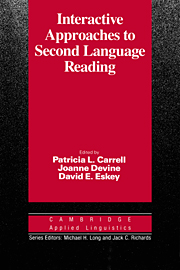Book contents
- Frontmatter
- Contents
- List of contributors
- Series editors' preface
- Preface
- Introduction: Interactive approaches to second language reading
- I INTERACTIVE MODELS OF READING
- II INTERACTIVE APPROACHES TO SECOND LANGUAGE READING – THEORY
- III INTERACTIVE APPROACHES TO SECOND LANGUAGE READING – EMPIRICAL STUDIES
- Chapter 9 A case study of two readers: models of reading and reading performance
- Chapter 10 Changes in cohesion in the recall of native and foreign texts
- Chapter 11 Reading English for specialized purposes: discourse analysis and the use of student informants
- Chapter 12 This test is unfair: I'm not an economist
- Chapter 13 The effects of induced schemata on the “short circuit” in L2 reading: non-decoding factors in L2 reading performance
- Chapter 14 The Miscue-ESL Project
- IV IMPLICATIONS AND APPLICATIONS OF INTERACTIVE APPROACHES TO SECOND LANGUAGE READING – PEDAGOGY
- Index
Chapter 11 - Reading English for specialized purposes: discourse analysis and the use of student informants
Published online by Cambridge University Press: 05 October 2012
- Frontmatter
- Contents
- List of contributors
- Series editors' preface
- Preface
- Introduction: Interactive approaches to second language reading
- I INTERACTIVE MODELS OF READING
- II INTERACTIVE APPROACHES TO SECOND LANGUAGE READING – THEORY
- III INTERACTIVE APPROACHES TO SECOND LANGUAGE READING – EMPIRICAL STUDIES
- Chapter 9 A case study of two readers: models of reading and reading performance
- Chapter 10 Changes in cohesion in the recall of native and foreign texts
- Chapter 11 Reading English for specialized purposes: discourse analysis and the use of student informants
- Chapter 12 This test is unfair: I'm not an economist
- Chapter 13 The effects of induced schemata on the “short circuit” in L2 reading: non-decoding factors in L2 reading performance
- Chapter 14 The Miscue-ESL Project
- IV IMPLICATIONS AND APPLICATIONS OF INTERACTIVE APPROACHES TO SECOND LANGUAGE READING – PEDAGOGY
- Index
Summary
Normative speakers of English around the world frequently need to read specialized English language material as part of their university course work. A traditional view held by the instructors in such specialized courses is that a knowledge of the technical terms, via a glossary, will provide the nonnative reader with what he needs, particularly in scientific texts. Experience has shown, however, that even students with mastery over the technical terms become so frustrated in reading technical English that they seek native-language summaries of the English texts, or nativelanguage books covering roughly the same material, or do not read the material at all, but concentate rather on taking verbatim lecture notes. This approach tends to produce a passive learning attitude rather than the active, exploring approach so necessary if students are to develop sufficient competence in English to read their subject matter freely.
As researchers have begun to investigate the reading problems of nonnatives, it has become clear that the difficulties extend beyond technical vocabulary. Fortunately, volumes are beginning to appear which document numerous ways in which subject matter written in English may be problematic for nonnative readers from one or various language backgrounds (see, for example, Todd-Trimble, Trimble, and Drobnic 1978). Several empirical studies in particular influenced the research reported in this article. Selinker and Trimble (1974: 81–82), for example, reported on their detailed research into the use of articles and verb tense in English for Specialized Purposes (ESP), because it seemed most crucial to the needs of engineering students.
- Type
- Chapter
- Information
- Interactive Approaches to Second Language Reading , pp. 152 - 167Publisher: Cambridge University PressPrint publication year: 1988
- 7
- Cited by



